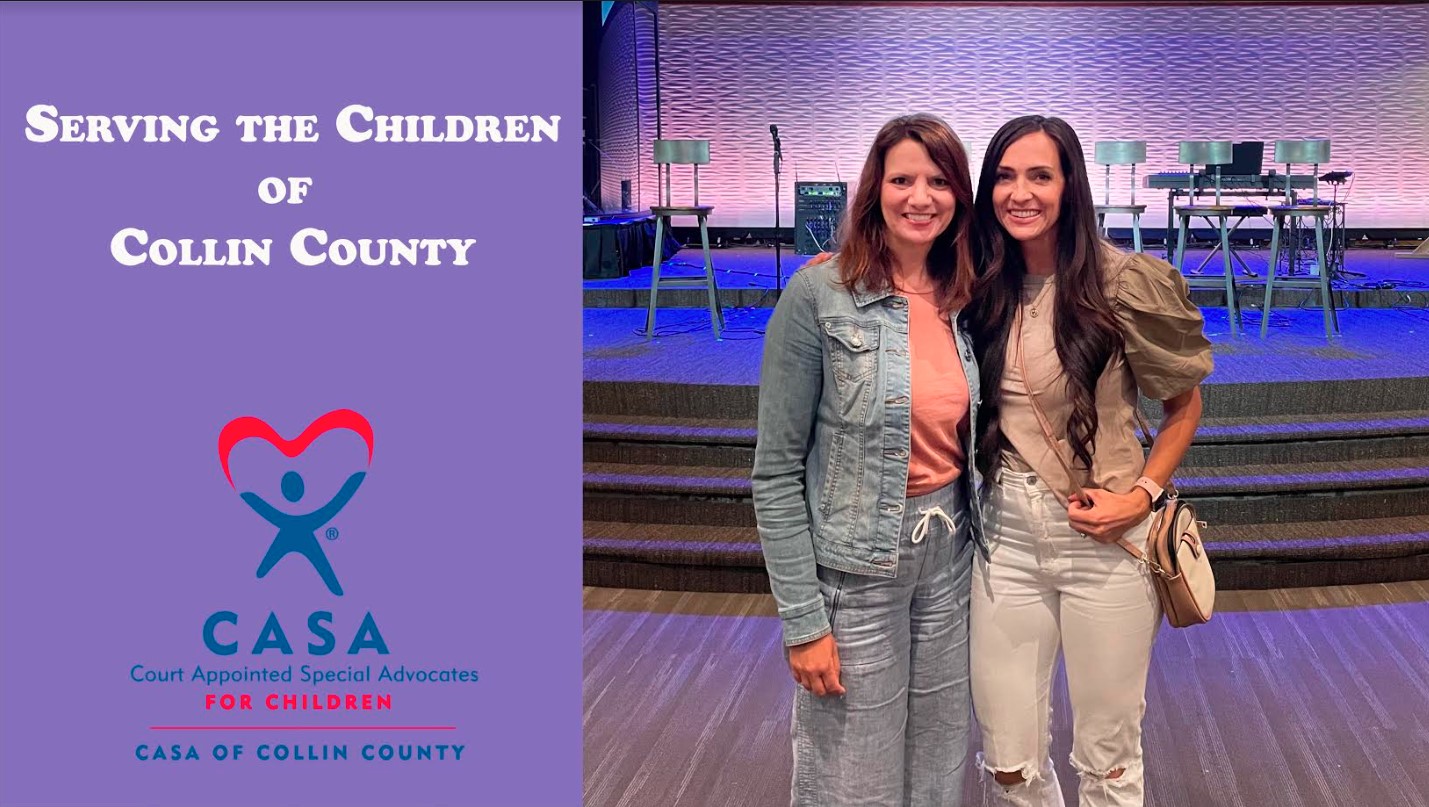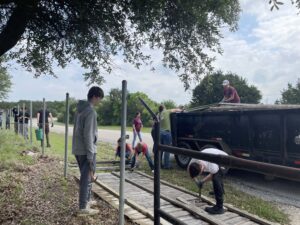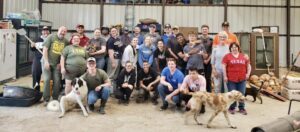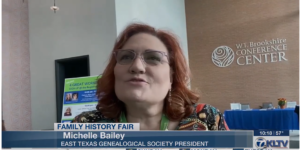Local CASA Volunteers Invite Others to Lean in and Promote Healing in the Foster Care Community
May is National Foster Care Month. This is the second article in a three-part series about the topic. Read Part 1 and Part 3. Watch video by Rich Thrasher below.

Prosper, Texas. Alicia Rothe and Heather Vandygriff first became friends through participation in a local congregation of The Church of Jesus Christ of Latter-day Saints. But their individual journeys to becoming CASA volunteers helped them discover a shared passion and heart for foster care children and families—work that helps them advocate for better awareness and community involvement in the ongoing needs of individuals in Collin County and North Texas. Their simple message? It really does take a village, and there is room for each of us to become a source of healing and strength for a child.
President Ronald Reagan first established National Foster Care Month in May 1988. This annual initiative acknowledges the work of the family members, volunteers, and professionals who help bring hope and connection to children and youth in foster care. According to the latest report by the Children’s Bureau, an office of the U.S. Department of Health & Human Services, approximately 407,000 children and youth currently live in foster care, with 34 percent of them in placement with relatives or kin and 45 percent in placement with non-relatives.
CASA is an acronym for Court Appointed Special Advocate, a legal advocate for children in the foster care system. Begun in 1976 from an inspired idea by Seattle juvenile court judge David W. Soukup, who was seeking better information on a child’s needs in a particular case, the CASA volunteer organization has grown to 950 programs in 49 states, with Texas providing 72 local programs across most counties and CASA of Collin County serving nearly 100 percent of foster children in the county since 1997.
Rothe describes what a CASA does: “We have a very special role with foster children where we get to be their voice in court. We are appointed by a judge to speak on their behalf and look out for their best interests. So, we are the judge’s extra eyes and ears out in the community looking for what they need: advocating for their mental health, their dental, their medical, and their educational [needs] and making sure that all those needs are being met while they maneuver through this system until the judge makes a decision on what placement is best for them.”


Whenever a child in Collin County is removed from the original home because of abuse or neglect, the judge typically sets a court date for 365 days in the future. “We have a year to work,” says Vandygriff, “and you think that sounds like a long time, but it…goes quickly in terms of giving the parents or [guardians] the opportunity to rectify any issues in the home so they can be reunified with them. Reunification is the goal.”
While parents are working on court-appointed benchmarks, a CASA not only checks in often with the child or children as well as the judge presiding over a case but also must work on finding alternative placements with extended family, family friends, or foster parents should the parents’ rights be terminated, and the children need a permanent home. Rothe explains, “There is a crucial time frame where we’re vetting out all the family members we can find; we’re creating family trees with the children. We’re trying to explore every avenue of family placements…. [but] anyone who cares for and loves these kids and will invest in them, we are very interested in interviewing and doing a background check on and referring them to CPS.” Vandygriff adds, “We try to discover and unearth any possible family member or family friend that would be involved in a supportive way in this child’s life.”

The CASA, who normally works with only one or two families at a time, can significantly lighten the load for a CPS caseworker who may have as many as a dozen or more cases. And depending on how a case progresses, the CASA may be with a child for years to come. Rothe shares, “We stay with them throughout their entire time in the system. As long as the state has permanent managing conservatorship over them, we will be with them as that constant in their life.”
Another important role for the CASA is gathering a community around the child and the foster family, as well as the biological family, to provide support. Both Rothe and Vandygriff honor schoolteachers for being invaluable resources in this way. Says Vandygriff, “When I have asked children, who is it that you can talk to if you have a need?… It’s so often the teachers…. those kids know that the teachers know them and care about them. Very often, if in a scary or traumatic or hard situation, they know that they can go to their teachers as one of their first lines of safety and protection and trust.”
Rothe recalls a time when she was struggling to find relatives who could care for a child but how a visit with his teacher about his schoolwork led to an unexpected placement: “[his teacher] said something about wanting to get foster-certified down the road and help children in the community.
“I just had this A-ha! moment where I thought: she could take him and be his placement. I proposed the opportunity to her. She immediately agreed. She was very happy to do so, and she has been an incredible source of healing and progress and growth for this child.”
Vandygriff’s experiences on the PTO board of an elementary school in Little Rock, Arkansas, several years ago, where she supported many children in foster care, is what she says first opened her eyes to the need for advocacy. Additionally, her subsequent volunteer work with City House. This Collin/Dallas County nonprofit provides emergency shelter and other assistance to at-risk, homeless, or foster children and teens, further educating her desire to help some of society’s most vulnerable. And when she read about one foster child’s experience with his CASA in a magazine, she thought, “That’s the level of commitment … [and] involvement that I want to be. I want to be up close and personal after my experience in Little Rock…. It changed me. I wanted that opportunity.” She finished her training and certification in early 2021 and is working with her first case.
Rothe began as a CASA in Dallas County about ten years ago but in 2019 decided to volunteer closer to home in Collin County. Of her initial choice to volunteer with CASA, she says, “Something [about it] just stood out to me. I feel it’s no coincidence; God kind of starts placing these opportunities in your path and fitted to your needs and talents and it just felt right. So, I went with it, and I got my first case and completely fell in love with the cause. I knew after my very first case that this is something I would do forever.”
She continues, “It was something about being in the trenches, working with those children. seeing the immediate impact that you’re having on their lives. Being able to be with them through the entire process, and building relationships and connections was such a gift. I fell in love with that.”

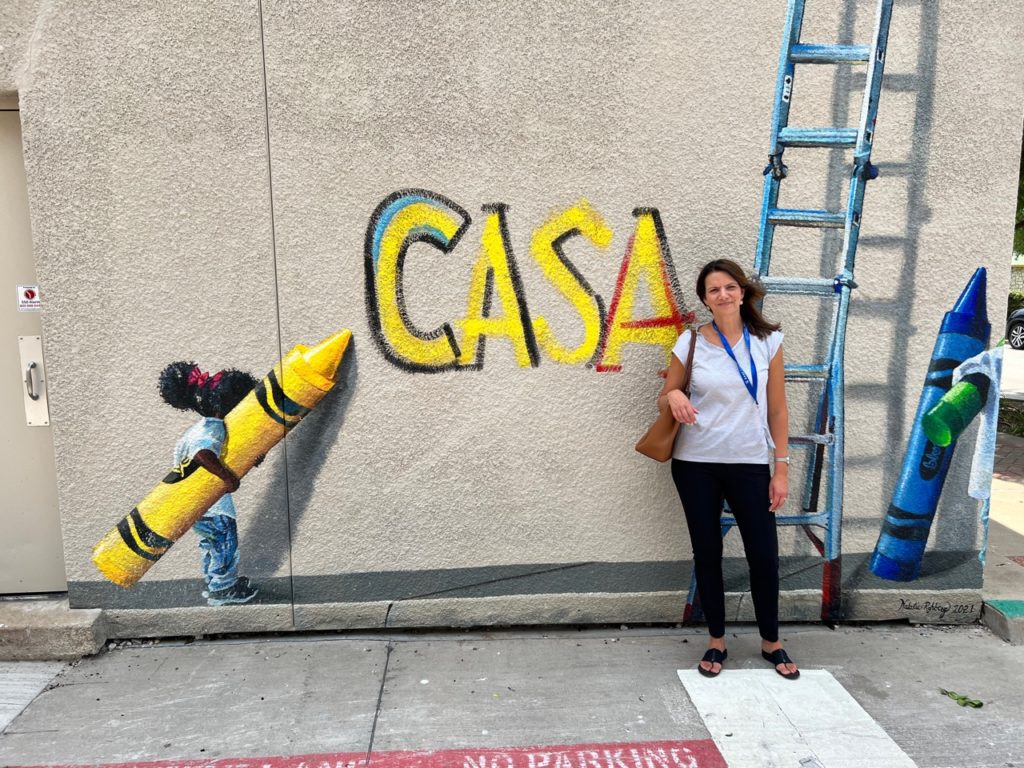
The foster care community always needs willing families and individuals to provide shelter, love, and advocacy, but Rothe and Vandygriff share other ways to be a source of hope. Rothe points out that abuse prevention helps stem the tide of foster children entering the system in the first place: “When you see someone at risk, when you see someone who is losing their job or going hungry or there is some violence going on in the home, reach out and become a support system to them…. Look for people who need a little extra assistance and love.”
Both women praise a newer North Texas nonprofit called Unfaulted, which helps young adult women who have aged out of foster care. Vandygriff emphasizes this is one of the hardest things that can happen to a foster child because when they turn 18 without adoption or foster placement, “they are sometimes handed a bus pass, a garbage bag for their belongings, and directions to the nearest homeless shelter.
“Sometimes that’s what aging out of foster care looks like, so you think about that [for someone who is] not a full functioning adult—you’re technically an adult, but you don’t have all the wherewithal or knowledge… to move forward in this world.”
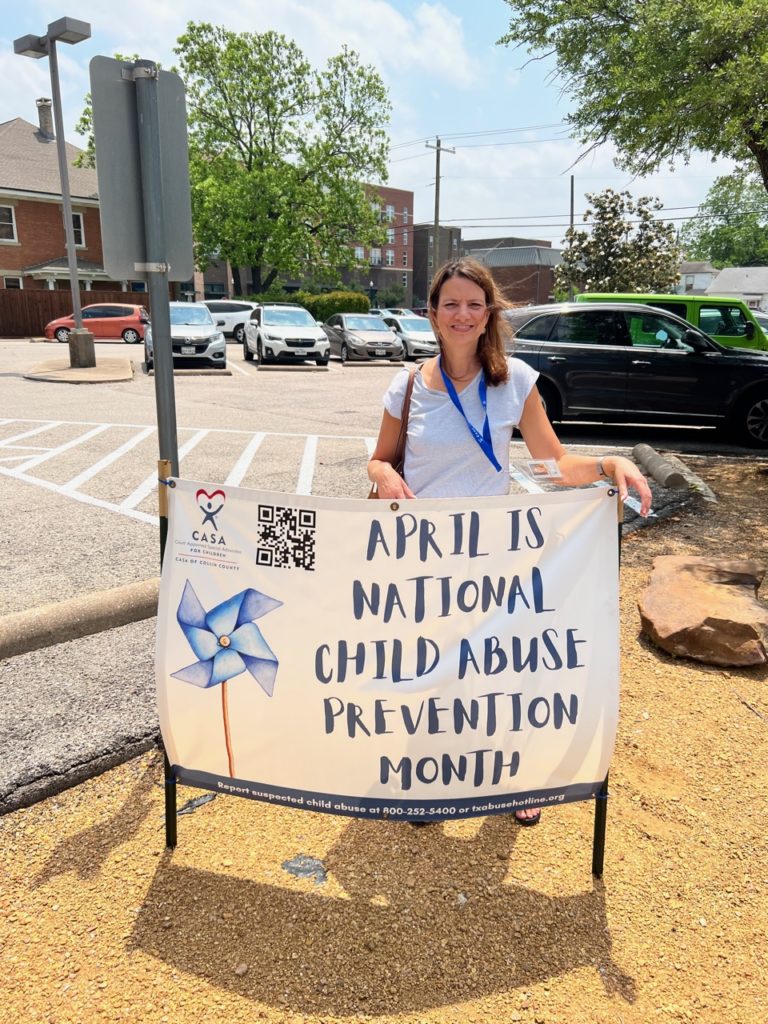
Vandygriff points out that a phrase she hears often in the Church of Jesus Christ, which emphasizes service to others through its lay ministry and full-time volunteer missionaries, is “called to serve.” But she considers it also a call to action, “a call to love and serve our neighbors. My heart has been turned toward the homeless, helpless, and hopeless for a long time…. There are so many ways to wrap around families and children in fractured circumstances. We are definitely called to serve.”
The service and relief one can offer will look different from someone else’s ability to serve. But doing anything to help will make a difference; as Vandygriff states, “Lean in, get as close as you can because the more you see and the more you understand what’s going on in these children’s lives, the more you’ll realize how to help.”
And as Rothe shares, “They often say in the CASA work, use your gut; work with your gut—but to me that’s the Spirit. There are times when I just know what God needs me to do for these kids and how I can help, and I know that that’s a gift from God. I must be ready to listen to that and act when it comes. It always ends up being such a beautiful blessing in the end.”
Both Rothe and Vandygriff acknowledge that heartache and brokenness exist in the work they do. But they also feel it is deeply rewarding. Vandygriff’s reward is seeing the resilience and strength of people as they overcome difficult obstacles—that one can “learn and grow from watching these kids who are stronger and more resilient than you could ever even imagine, who keep picking back up, who keep moving and who keep overcoming on a constant basis.”
Rothe affirms that her belief in Jesus Christ as her advocate, comforter, and healer helps her know how to share those gifts with and succor others. She says that her favorite word when she thinks of CASA work is healing: “Nothing is as black and white as it seems. There is so much that we don’t understand about systemic family issues that are going on in the family. When given the opportunity to rise above that, so many people jump at that chance; they just need someone to invest in them…. As they work the services that the court has ordered them to do—the parenting classes, the counseling, the drug addiction classes—as they’ve cleaned up their lives for the benefit of their children, I’ve learned that love is a very powerful force for change, and these parents have overcome some of the worst odds you can imagine. You’re so touched to be able to see that, to see people heal and change.”
Vandygriff agrees. “Because of the Savior [I have] an understanding that anyone can change, that there is hope for anyone and for everyone through the Savior and through love…. What changes people is loving them. When people feel loved, they feel hope. They feel like there’s opportunity for them. So, we bring that love. We bring that love of the Savior in a variety of ways, and we pour it upon these kids and their families the best way that we know how, and then we hope that the Savior continues from there.
“Love really is the healer. It’s the magic.”
Kara Schofield lives with her husband, nearly grown youngest, and the family doodle in the Prosper Texas Stake of The Church of Jesus Christ of Latter-day Saints. She can often be found at one keyboard or another: writing, documenting personal and family history, accompanying school choirs, and learning how to play jazz music. Her greatest joys are her four children and their spouses, a sizable extended family, pies, mountains, and Jesus Christ.

